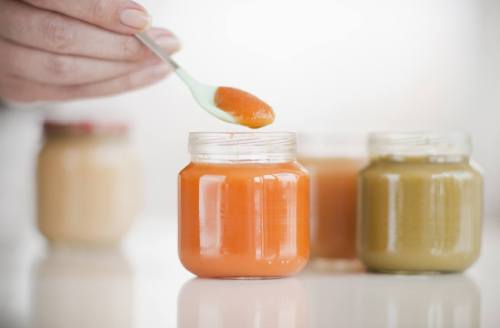New parents have enough things to worry about—making your own baby food doesn’t need to be one of them
New parents already have enough on their plates...so how criticial is it really to make your own baby food? Experts settle the debate once and for all.

When it comes to new babies, everyone seems to have strongly-held opinions on how parents decide to care for their child. Whether it’s panic about what to eat when breastfeeding, pointed comments from your MIL about the merits of letting kids “cry it out,” or even randos leaving comments on your IG criticizing how you’re holding your baby in your vacation pic… everyone has something to say. Including, of course, what you feed your child.
We won’t get into the breastfeeding versus formula debate because that’s a whole other Thing, but generally, babies are ready to start eating solid foods between four and six months of age, says Dyan Hes, MD, a pediatrician and founder of Gramercy Pediatrics. “Babies can start with purees—meats, fruits, vegetables, yogurts, or cereals. It is really a personal choice of the family,” she says. Emphasis on personal choice—yet if start scrolling through Instagram or parenting forums, you’ll see a lot of people talking about how making your own baby food is the ONLY way to go.
My own daughter just hit that six-month mark, which has had me wondering about the merits of this whole ethos. Taking care of a baby already involves a lot of worry (and not a lot of sleep). Do I really need to make all of her first foods from scratch? I tapped some experts to get the low-down.
How necessary is it to make my own baby food?
“Most of us love the idea of freshly preparing each of our child’s meals, but the reality is that many families don’t have the flexibility to do that,” says Teresa Purzner, MD, a neurosurgeon and founder of organic baby food line Cerebelly. In the opinion of many experts, it’s not even necessary given the improvements in what’s available in-store. “The baby food market has taken a turn for the positive,” says Ayelet Goldhaber, MS, RD, a registered dietitian at NYU Langone’s Hassenfeld Children’s Hospital. “There are now tons of baby food companies producing high quality baby foods made from whole and organic ingredients.” She recommends all parents have a stash of store-bought options for when they can’t (or choose not to) make their own baby food.
New mom looking for some “me time?” Try this awesome post-natal workout:
Of course, making your own food can also be beneficial for your child—if you do it the right way. “Making homemade food can be a way to bond with your baby,” says Kristi L. King, MPH, RDN, CNSC, LD, a senior dietitian at Texas Children’s Hospital and a spokesperson for the Academy of Nutrition and Dietetics. But she cautions that there are a lot of food safety rules to remember when you’re cooking food intended for babies. “Infants are at increased risk for food borne illnesses due to their compromised immune system, so wash your hands and practice good home food safety,” she says. For example, prepare meat on a separate cutting board from all other foods to avoid potentially contaminating the baby’s food with bacteria. Baby food should also be stored in airtight containers and used within three days, she adds.
What are some rules of thumb when buying food for a baby?
Whether you’re making food from scratch or buying pre-made items for your baby, choosing organic should be a factor, but it’s not the be-all and end-all. “It’s always better to avoid chemicals and pesticides, if your budget allows,” Dr. Purzner says. “In particular, you should try to avoid the ‘dirty dozen,’ which is a list of [conventionally-grown] foods that are found to have the highest levels of pesticide residue based on Department of Agriculture data.” (Strawberries and kale topped 2019’s list, FYI.) However, Dr. Hes says you don’t need to feel bad if you aren’t able to find or afford organic items. “To date, no scientific study has proven that eating organic food is protective against any illness,” she says. “I think it is more important to use meats and dairy that have been sourced from animals who have not been treated with hormones. We do know that hormones in an animal’s diet can alter the endocrine system of the consumer.”
When buying pre-made baby food, King has a few additional recommendations. “You do not want to see any additional additives, or preservatives, and foods should not contain any added sugars,” says King. “The baby food should only contain the food you are purchasing. If you are buying green beans, it should have ‘green beans’ listed as the ingredient.” She notes that sometimes you will see ascorbic acid or vitamin C added, which she says is okay. It’s also a good idea to go for food in BPA-free packaging if you can, since BPA is a hormone-disrupting chemical that may be harmful for developing babies.
Like Dr. Hes said, the foods you feed your baby are really a personal choice—no matter what your judgy mother-in-law says. Whether you go store-bought or homemade, you’re still doing right by your child. Now if only we could get them to sleep all the way through the night…
This new brand is focusing on post-natal health needs for moms. And here are some of the most common fertility myths experts want you to stop believing.
Sign Up for Our Daily Newsletter
Get all the latest in wellness, trends, food, fitness, beauty, and more delivered right to your inbox.
Got it, you've been added to our email list.










